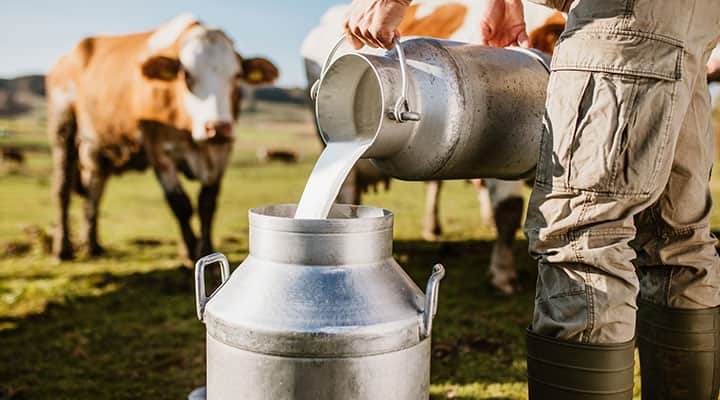
5 Ways to Protect Your Health from Aging Immune Cells
Published: May 2020
There are many wonderful things about getting older: wisdom, memories and the confidence to speak your mind without worrying about what other people think. But the physical changes that occur due to aging are not so wonderful, to say the least. We’re not just referring to gray hairs or walking with less spring in your step. As we age, our cells age, too—a process called cellular senescence. Senescent cells don’t look or act like normal, healthy cells. Instead, they tend to have a grainy appearance, take on odd shapes and sizes and secrete damaging molecules and cytokines that can lead to illness, according to now-famous research published by L. Hayflick in 1961. Even more troubling, the cells that support our immune health can also become senescent, a process called immunosenescence.
What is immunosenescence?
Immunosenescence is the deterioration of the immune system due to aging, and it’s a particular problem among the elderly. Just as senescence refers to the aging of cells, immunosenescence describes the aging of cells that specifically support the immune system. Immune cells that change due to age include:
-
T cells—We are born with something called naïve T cells, which recognize and respond to many illnesses, from the flu to cancer. As we age, we produce fewer of these important cells, while the number of senescent memory T cells increases. Instead of tackling diseases, senescent memory T cells actually release molecules that contribute to inflammation.
-
Natural killer (NK) cells—As their name suggests, these cells kill threats to our immune system, so we won’t get sick. We stop producing NK cells as we age, though, and that can lead to infections and other types of illness, including arterial disease.
Certainly, senescent cells put us at a disadvantage when it comes to fighting off illnesses and infections—in fact, they even make flu shots less effective. But is there anything we can do to protect ourselves from the dangers of immunosenescence? Indeed, with the right diet and lifestyle choices, we may be able to keep our immune system strong, well into our golden years. Here’s how to combat this attack on your healthy immune cells.
5 ways to fight immunosenescence
1. Eat an immune-healthy diet

Numerous studies have found that eating a Mediterranean diet protects against age-related conditions that are also associated with immunosenescence, including atherosclerosis and cancer and neurodegenerative disease (Casas 2014; Estruch 2010). Not only will you shore up your natural defenses by following the Mediterranean diet, but you’ll also avoid some of the health problems associated with a poor diet, such as life-threatening obesity and diabetes. Enjoying these benefits is as simple as dining like you've taken a fabulous bucket list vacation to the countries on the Mediterranean Sea's glittering blue waters and are eating like a local. That involves piling your plate high with fruits, vegetables, legumes, whole grains, nuts and seeds. Oh, and don’t forget the olive oil. Meanwhile, skip red and cured meats, as well as foods that incorporate refined sugar. If you’re going to drink, a glass of red wine at dinner is fine, but don’t over-indulge.
Another dietary option that many longevity enthusiasts have flocked to is calorie restriction, which has been shown to produce more youthful T cells. With a reduced calorie diet, you will want to eat more plant-based foods while avoiding animal products and refined sugars. Beyond that, you’ll also want to keep close tabs on how many total calories you’re consuming. This might sound great in theory, but you may have second thoughts about this approach when you can’t resist passing up on seconds. Stay strong, and recall that studies of caloric restriction reduced immune senescence in mice. Compared with mice that were fed freely, the calorie-restricted mice had greater proliferation and diversity of T cells (Yang 2009).
2. Pump up your natural defenses with exercise

If you think exercise is only for the young and limber, think again. Exercise is about much more than perfecting your beach body—in fact, more impressively than strengthening your muscles, exercise strengthens your immune system. A 2011 study demonstrated that aerobic fitness is associated with reduction in senescent T cells (Spielmann 2011).
Not sure where to start? The key is to find an activity that elevates your heart rate without risking over-exertion. It’s similar to “Goldilocks and The Three Bears”—you want to avoid exercise that’s too easy or too hard, and shoot for a workout that’s just right. Research suggests that over-doing it temporarily suppresses immune function (Simpson 2015; Gleeson 2013; Zheng 2015). We don’t want that! On the other hand, a 10-month study comparing older adults who engaged in moderate exercise to those who only did flexibility and balancing activities, determined that only those who worked up a sweat had improved antibody response to the flu shot (Woods 2009).
3. Sleep your way to a healthier immune system

“You snooze, you lose” does not apply to your immune system! In fact, skipping sleep can reduce the number of our NK and T cells, as well as our B cells, which are the ones that generate antibodies for specific diseases (Zuppa 2015; Bollinger 2009). Even one night of tossing and turning can have a negative impact on your immune system. It’s also worth noting that a few different studies concluded that immunizations didn’t work as well for patients who didn’t sleep well (Carroll 2016).
To ease your way into better ZZZs, establish regular sleeping and waking times, avoid eating a heavy meal right before bed and don’t fall asleep while the TV is on; learn how to fall asleep while you’re still awake for optimal rest. Melatonin is a hormone made in the pineal gland that lets us know when it’s time to sleep and time to wake up. When we don’t naturally produce enough of it—which, like senescence, happens with age—we can have trouble sleeping, or may even experience insomnia.
4. Understanding the relationship between stress and immunosenescence

It’s pretty much impossible to avoid stress. Especially if you’ve lived to the ripe age where mortgages, illness and other stressors are part of your daily existence. However, you can control how intensely you react to stress, how much of a burden you agree to take on--whether at work or with loved ones--and you can engage in self-care activities that promote relaxation, like mediation or yoga. These small lifestyle changes truly will allow you to own your wellness!
If you consider yourself a Type A person who just doesn’t “do” relaxation, consider this: chronic stress has been linked directly to immunosenescence. Several tied the hormone cortisol, which is secreted when we are stressed, to the senescence of immune cells (Bosch 2009; Bauer 2015). In fact, the ratio of cortisol to another adrenal hormone, dehydroepiandrosterone (DHEA), may be an important determinant of immunosenescence (Bauer 2008).
So…maybe that yoga mat isn’t such a crazy idea? If you still say “nah” to namaste, note that any activity that allows you to unwind can make a difference—knitting, walking your dog or fishing are all good solutions, if they help you relax.
5. Consider natural approaches to supporting a healthy immune system

Diet, exercise and lifestyle choices, like getting enough sleep and avoiding stress, are great ways to support a healthy immune system and reduce the likelihood and prevalence of immune cell senescence. But there are also nutrients you can add to your diet, which might give your immune cells an extra edge. One of them is the medicinal mushroom reishi, which has been used in Asia for immune support for over 2,000 years. Laboratory and animal studies have shown that this fabulous fungus positively affects T cells and NK cells, among other immune-supporting functions (Batra 2013; Jin 2012; Xu 2011).
Another foe of immunosenescence is the desert plant cistanche. Several studies demonstrated that cistanche promoted significant increases in naïve T cells and NK cells and reductions in those unwanted, senescent memory T cells (Zhang 2014; Abe 1994; Butterfield 2005).
Other nutrients, including enzymatically modified rice bran, extract from Pu-erh tea, zinc, vitamin E and fucoidan—which comes from seaweed—have all been found to have positive effects on the health of immune cells. For more information, check out our Immune Senescence Protocol.
With the right lifestyle tweaks and nutrients, immunosenescence doesn’t have to be part of your aging process. Own your wellness and start aging like a fine wine—a red wine, of course, enjoyed with some Mediterranean cuisine!
References
- Abe Y, Yuasa M, Kajiwara Y, Hosono M. Defects of immune cells in the senescence-accelerated mouse: a model for learning and memory deficits in the aged. Cell Immunol. Aug 1994;157(1):59-69.
- Batra P, Sharma AK, Khajuria R. Probing Lingzhi or Reishi medicinal mushroom Ganoderma lucidum (higher Basidiomycetes): a bitter mushroom with amazing health benefits. International journal of medicinal mushrooms. 2013;15(2):127-143.
- Bauer ME. Chronic stress and immunosenescence: a review. Neuroimmunomodulation. 2008;15(4-6):241-250.
- Bauer ME, Wieck A, Petersen LE, Baptista TS. Neuroendocrine and viral correlates of premature immunosenescence. Annals of the New York Academy of Sciences. Sep 2015;1351:11-21.
- Bollinger T, Bollinger A, Skrum L, Dimitrov S, Lange T, Solbach W. Sleep-dependent activity of T cells and regulatory T cells. Bollinger T, Bollinger A, Skrum L, Dimitrov S, Lange T, Solbach W. Sleep-dependent activity of T cells and regulatory T cells. Feb 2009;155(2):231-238.
- Bosch JA, Fischer JE, Fischer JC. Psychologically adverse work conditions are associated with CD8+ T cell differentiation indicative of immunesenescence. Brain Behav Immun. May 2009;23(4):527-534.
- Butterfield DA, Poon HF. The senescence-accelerated prone mouse (SAMP8): a model of age-related cognitive decline with relevance to alterations of the gene expression and protein abnormalities in Alzheimer's disease. Experimental gerontology. Oct 2005;40(10):774-783.
- Carroll JE, Cole SW, Seeman TE, et al. Partial sleep deprivation activates the DNA damage response (DDR) and the senescence-associated secretory phenotype (SASP) in aged adult humans. Brain Behav Immun. Jan 2016;51:223-229.
- Casas, Rosa et al. “The immune protective effect of the Mediterranean diet against chronic low-grade inflammatory diseases.” Endocr Metab Immune Disord Drug Targets. 2014, https://pubmed.ncbi.nlm.nih.gov/25244229/
- Casas R, Sacanella E, Estruch R. The immune protective effect of the Mediterranean diet against chronic low-grade inflammatory diseases. Endocrine, metabolic & immune disorders drug targets. 2014;14(4):245-254.
- Estruch R. Anti-inflammatory effects of the Mediterranean diet: the experience of the PREDIMED study. Proc Nutr Soc. Aug 2010;69(3):333-340.
- Gleeson M, Williams C. Intense exercise training and immune function. Nestle Nutrition Institute workshop series. 2013;76:39-50.
- Hayflick, L. “The limited in vitro lifetime of human diploid cell strains.” Experimental Cell Research, March 1965, https://www.sciencedirect.com/science/article/abs/pii/0014482765902119
- Jin X, Ruiz Beguerie J, Sze DM, Chan GC. Ganoderma lucidum (Reishi mushroom) for cancer treatment. The Cochrane database of systematic reviews. 2012;6:CD007731.
- Simpson RJ, Kunz H, Agha N, Graff R. Exercise and the Regulation of Immune Functions. Progress in molecular biology and translational science. 2015;135:355-380. Spielmann, Guillaume et al. “Aerobic fitness is associated with lower proportions of senescent blood T-cells in man.” Brain Behav Immun. November 2011, https://pubmed.ncbi.nlm.nih.gov/21784146/
- Spielmann G, McFarlin BK, O'Connor DP, Smith PJ, Pircher H, Simpson RJ. Aerobic fitness is associated with lower proportions of senescent blood T-cells in man. Brain Behav Immun. Nov 2011;25(8):1521-1529.
- Woods JA, Keylock KT, Lowder T, et al. Cardiovascular exercise training extends influenza vaccine seroprotection in sedentary older adults: the immune function intervention trial. J Am Geriatr Soc. Dec 2009;57(12):2183-2191.
- Xu Z, Chen X, Zhong Z, Chen L, Wang Y. Ganoderma lucidum polysaccharides: immunomodulation and potential anti-tumor activities. The American journal of Chinese medicine. 2011;39(1):15-27.
- Yang H, Youm YH, Dixit VD. Inhibition of thymic adipogenesis by caloric restriction is coupled with reduction in age-related thymic involution. J Immunol. Sep 1 2009;183(5):3040-3052.
- Zhang K, Ma X, He W, et al. Extracts of Cistanche deserticola Can Antagonize Immunosenescence and Extend Life Span in Senescence-Accelerated Mouse Prone 8 (SAM-P8) Mice. Evidence-based complementary and alternative medicine: eCAM. 2014;2014:601383.
- Zheng Q, Cui G, Chen J, et al. Regular Exercise Enhances the Immune Response Against Microbial Antigens Through Up-Regulation of Toll-like Receptor Signaling Pathways. Cell Physiol Biochem. 2015;37(2):735-746.
- Zuppa C, Prado CH, Wieck A, Zaparte A, Barbosa A, Bauer ME. Acupuncture for sleep quality, BDNF levels and immunosenescence: a randomized controlled study. Neuroscience letters. Feb 5 2015;587:35-40.
Like what you read?
Please subscribe to get email updates on this blog.



